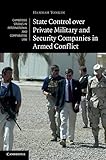State control over private military and security companies in armed conflict / Hannah Tonkin.
By: Tonkin, Hannah.
Material type: TextSeries: Cambridge studies in international and comparative lawNew series: Publisher: Cambridge, U.K. ; New York : Cambridge University Press, 2011Description: xxiv, 310 p. ; 24 cm.ISBN: 9781107008014 (hbk.); 1107008018 (hbk.).Subject(s): Mercenary troops (International law) | Mercenary troops -- Legal status, laws, etc | Private military companies (International law) | Private military companies -- Law and legislation | Private security services -- Law and legislationDDC classification: 355.35 Other classification: LAW051000 Online resources: Cover image
TextSeries: Cambridge studies in international and comparative lawNew series: Publisher: Cambridge, U.K. ; New York : Cambridge University Press, 2011Description: xxiv, 310 p. ; 24 cm.ISBN: 9781107008014 (hbk.); 1107008018 (hbk.).Subject(s): Mercenary troops (International law) | Mercenary troops -- Legal status, laws, etc | Private military companies (International law) | Private military companies -- Law and legislation | Private security services -- Law and legislationDDC classification: 355.35 Other classification: LAW051000 Online resources: Cover image | Item type | Current location | Call number | Status | Date due | Barcode | Item holds |
|---|---|---|---|---|---|---|
 Books
Books
|
Prof. G. K. Chadha Library
South Asian University |
355.35 T665s (Browse shelf) | Available | BK00010435 |
Includes bibliographical references (p. 264-293) and index.
The private security industry uncovered -- State obligations and state responsibility -- The attribution of PMSC conduct to the hiring state -- Obligations of the host state -- Obligations of the hiring state -- Obligations of the home state.
"The past two decades have witnessed the rapid proliferation of private military and security companies (PMSCs) in armed conflicts around the world, with PMSCs participating in, for example, offensive combat, prisoner interrogation and the provision of advice and training. The extensive outsourcing of military and security activities has challenged conventional conceptions of the state as the primary holder of coercive power and raised concerns about the reduction in state control over the use of violence. Hannah Tonkin critically analyses the international obligations on three key states - the hiring state, the home state and the host state of a PMSC - and identifies the circumstances in which PMSC misconduct may give rise to state responsibility. This analysis will facilitate the assessment of state responsibility in cases of PMSC misconduct and set standards to guide states in developing their domestic laws and policies on private security"--Provided by publisher.
"The past two decades have witnessed the rapid growth and consolidation of the global private security industry. Tens of thousands of contractors working for private military and security companies (PMSCs) now provide a wide range of services to states, international organisations, corporations and non-governmental organisations around the world. Many PMSCs operate in zones of armed conflict, where they carry out functions that were formerly the exclusive domain of the armed forces. In this context, PMSCs have performed coercive activities such as offensive combat, armed security and the detention and interrogation of prisoners, as well as non-coercive activities such as military advice and training, transport, housing and intelligence collection and analysis"--Provided by publisher.
